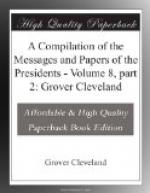It is thus seen that the assault upon and reduction of Fort Sumter was in no sense a matter of self-defense on the part of the assailants. They well knew that the garrison in the fort could by no possibility commit aggression upon them. They knew—they were expressly notified—that the giving of bread to the few brave and hungry men of the garrison was all which would on that occasion be attempted, unless themselves, by resisting so much, should provoke more. They knew that this Government desired to keep the garrison in the fort, not to assail them, but merely to maintain visible possession, and thus to preserve the Union from actual and immediate dissolution, trusting, as hereinbefore stated, to time, discussion, and the ballot box for final adjustment; and they assailed and reduced the fort for precisely the reverse object—to drive out the visible authority of the Federal Union, and thus force it to immediate dissolution. That this was their object the Executive well understood; and having said to them in the inaugural address, “You can have no conflict without being yourselves the aggressors,” he took pains not only to keep this declaration good, but also to keep the case so free from the power of ingenious sophistry as that the world should not be able to misunderstand it. By the affair at Fort Sumter, with its surrounding circumstances, that point was reached. Then and thereby the assailants of the Government began the conflict of arms, without a gun in sight or in expectancy to return their fire, save only the few in the fort, sent to that harbor years before for their own protection, and still ready to give that protection in whatever was lawful. In this act, discarding all else, they have forced upon the country the distinct issue, “Immediate dissolution or blood.”
And this issue embraces more than the fate of these United States. It presents to the whole family of man the question whether a constitutional republic, or democracy—a government of the people by the same people—can or can not maintain its territorial integrity against its own domestic foes. It presents the question whether discontented individuals, too few in numbers to control administration according to organic law in any case, can always, upon the pretenses made in this case, or on any other pretenses, or arbitrarily without any pretense, break up their government, and thus practically put an end to free government upon the earth. It forces us to ask, Is there in all republics this inherent and fatal weakness? Must a government of necessity be too strong for the liberties of its own people, or too weak to maintain its own existence?
So viewing the issue, no choice was left but to call out the war power of the Government and so to resist force employed for its destruction by force for its preservation.




